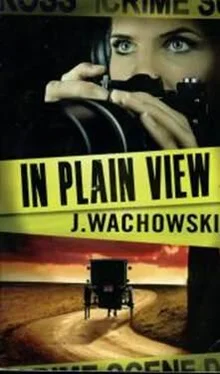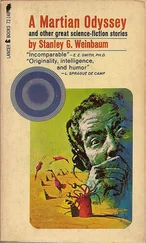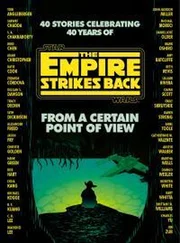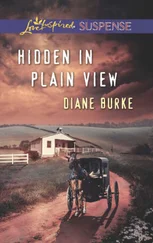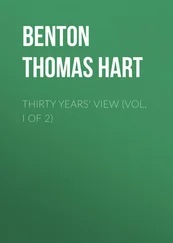“Old Mr. Jost? I couldn’t say,” Lowe mumbled.
Ainsley popped his head around the camera. “Has he even got a phone?”
“There’s a booth out back,” Lowe answered. To me he said, “The Amish don’t allow phones in their homes. It’s one of their rules. No wires to the outside world on their homes. They get around it by putting the phone in a separate little building, like a phone booth, that’s outside apart from the house.”
“An Amish family lives there?” I couldn’t help pointing. “In that house?”
“Yeah.” Lowe turned away from me and the relentless stare of the camera.
“What about cell phones?” I asked, thinking of the girl in the bush. “No wires on a cell phone. Do they allow those?”
“No. Don’t think so,” he snorted. “They’d have to charge it somewhere.”
“Oh yeah.” I laughed. Joke on me.
“Is that it?” Lowe’s reluctance suddenly took a shape I recognized.
Gently I asked, “Did you know the man who died?”
His chin dropped to his chest. There was silence for a good twenty seconds.
“Suppose it’ll come out sooner or later… Yeah, I knew him. Damn shame. Seemed to be getting along alright these past few years. Boy’s name was Tom. Tom Jost. He was adopted by my neighbor over there-” Lowe jerked his head in the direction of the farmhouse, “-years ago. Kid had a hard life and old Jost tried to do right by him. I respected him for that.” He half-turned his back to the camera, mumbling. “Some hard years for a while there. Teenage stuff mostly, not too bad. But Old Mr. Jost is religious, you know, so he didn’t see it that way. Boy left the farm, never came back.”
Except to die.
“Why’d he choose this tree?”
No answer.
“Do you know why Tom chose this tree?”
Lowe’s whole face tightened and I wished he’d have been facing the camera, instead of looking over at Mr. Jost’s farm. “Guess I do.”
“Why?” I whispered.
The quick glance he shot my way held all sorts of implications, but I needed words for the tape.
“This going to be on TV, Miss O’Hara?”
“Yes, we hope so.”
“The Amish don’t care to be photographed, you know.”
It was a warning. Stay away from Old Mr. Jost.
“Yes. I’ve heard that.”
Lowe turned and pointed a finger at the oak. “That tree is over a hundred years old, you know. The town moved the road for that tree.”
The morning sun was fully awake and the leaves on the sunny side were glowing.
“Seen a lot, that tree. It was worth moving the road around it.”
I nodded. “It’s a beautiful tree.”
“I suppose that boy would have found himself another tree someplace else,” he said and it was almost a question. The rest wasn’t. “There are things worth trying to preserve, Miss O’Hara. Even when you can’t.”
I wasn’t sure how to answer. He was speaking a local dialect of neighborhood history, a language I’d never understand without translation. I hesitated, searching for what to ask next and I lost him.
Lowe made his decision. He stuck out his rough, tanned hand and shook my own-goodbye. Interview over.
Damn. “Well, thanks for agreeing to meet with us, Mr. Lowe.”
“That’s no problem.”
“Can I ask you one more thing?”
“No.”
I’m not so young I can’t remember back to the days when shame was still serious business. As a kid, I remember people averting their eyes at something awful, instead of reaching for their camcorders.
How many times did I hear the words, hurry, don’t let anyone see. What will the neighbors think? Bad enough. But now the pendulum’s swung so far the other way nobody can turn on the TV or open a newspaper without somebody flashing their streaky underpants in your face. How is that an improvement?
The problem isn’t that it’s so painfully tacky, it’s that we have only so much time, so much compassion, for our fellow human beings. I want to focus on trouble that matters. Ending wars, and hunger, and the sickness we know how to cure if we’d only pay attention. If the freaks would stop distracting us.
Which is a long way of explaining that even though people like farmer Al Lowe made my job harder, I can’t say I always mind.
I followed him over to his standard issue, rusty pickup. “Mr. Lowe?”
He climbed in the cab and slammed the door shut before he answered. “Yeah?”
That one meant, don’t push your luck, lady.
“No camera. I’m just wondering, do you have any idea who alerted the authorities about the body? Could it have been your neighbor?”
“No. Had to be someone before that,” Lowe said. “Sorry.”
I said, thanks , but it bothered me. Usually, it was easy to find the person who’d tipped the authorities on something like this. Even if it was a random bystander, they generally had an emotional stake in telling the story again. The thirty-second hero was an easy interview to bag.
“One last thing-have the police identified the body as Tom Jost?” I didn’t want either of us getting into trouble for not passing along important information.
“Oh yeah.” Lowe hooked a hand over the steering wheel and his mouth registered a nasty-tasting frown. “They know.”
Questions started popping in my head, but Lowe slipped the truck into gear and revved the engine.
I nodded and he returned the gesture. With the big bill on his cap, it looked like he was tipping his hat to me; a move that registered as perfectly midwestern, formal and yet familiar. I bit my tongue and stepped back to watch the truck drag a line of dust into the air as he cut back onto the road.
“Keep it rolling,” I told Ainsley. “I want the truck.”
Jenny popped her head out of the door. “How much longer?”
I started to say we were done, when I noticed action up at the Jost farmhouse. Somebody had come out to gather the laundry. A pair of little girls and a boy were dodging between sheets draped in rows, playing at hide-and-seek as the wind flicked the bed tails. If I strained to listen, I could hear the squeals as they popped in and out.
“Shoot it,” I ordered Ainsley.
He looked around, shielding his eyes from the sun. “Those kids playing?”
“Yeah.” And this one meant, trust me. “Quick, College. Before it’s gone.”
He zipped the camera off the tripod and propped it on his shoulder for the shot. I had a sinking feeling that we’d lose the image because he wasn’t used to shooting hand-held, or worse, he couldn’t see the picture I wanted. Sometimes that happens. They just can’t see.
“How much longer, Aunt Maddy?” Jenny whispered.
I was startled to find her right there, at my side all of a sudden. “I don’t know. Not long.”
“Oh man!” Ainsley finished all his maneuvers and turned to face us, the camera still resting on his shoulder. He sounded pumped. “This was great. What next?”
I wanted to walk up to the farm and knock on the door, but Jenny was quietly pulling my sleeve to check my watch. I took the hint. “We better head back to the station. Check in with Gatt. And we’ve got to drop Jenny on the way. At school.”
“Sure,” Ainsley assured her with a smile. His sandy hair seemed to change color to suit his environment. In the morning sun, he was blond as a prom date.
“I’ll help strike.”
“No. I’ve got it.”
I admit I was itching to help wrap the equipment. You learn to pack fast when the aftershocks are bringing the building down around your ass. Unfortunately, Ainsley’s progress was about as urgent as the seasons changing.
By the time we delivered Jenny to school, then found a gas station with a quick mart, the best part of the morning was gone.
Читать дальше
